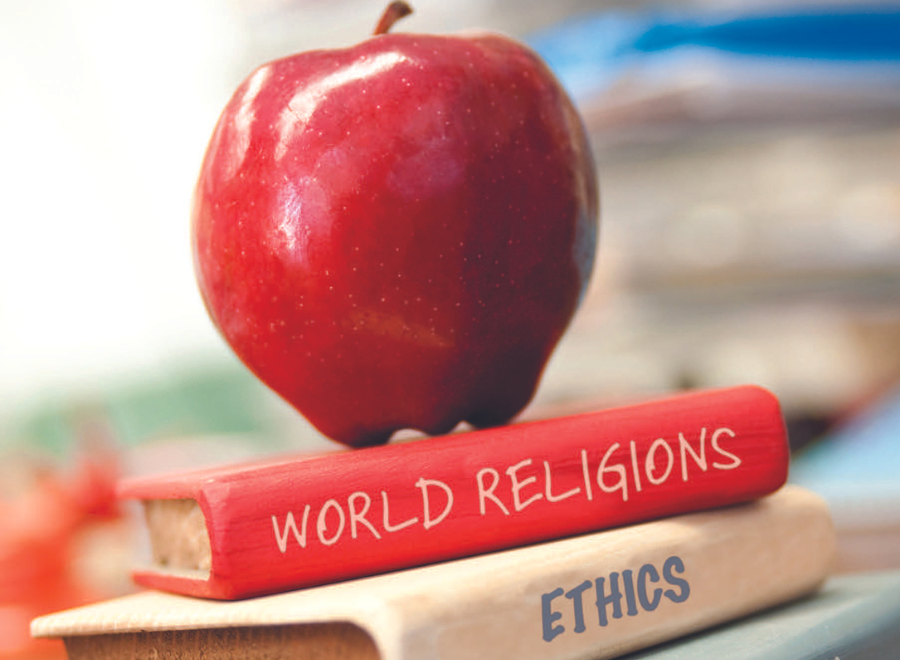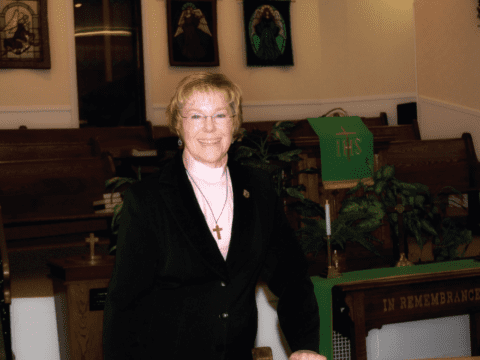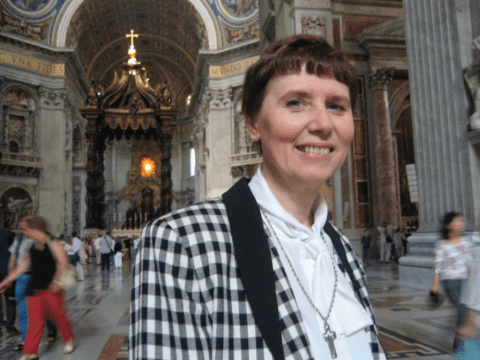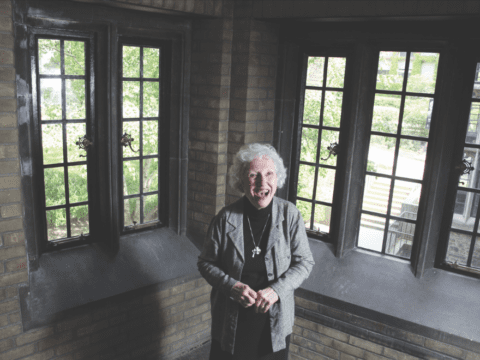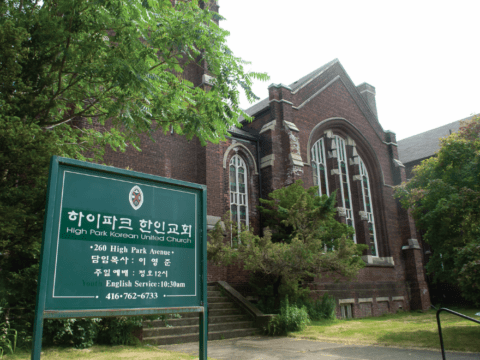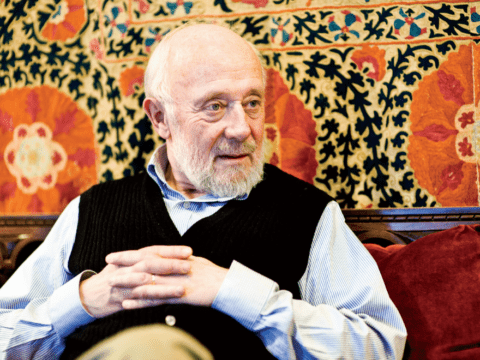“Guillaume is new in town,” reads Marnie Rail to her Grade 4 and 5 class at Honoré Mercier Elementary School in Montreal. Having moved to Quebec from abroad, the fictional Guillaume feels disoriented and lonely, Rail explains. Then she asks her students what they would do if he attended their school.
“I would ask him about himself,” says a child confidently.
“I would ask him to be my best friend,” says another.
Next to the staff-room microwave during lunch hour, Rail smiles as she recalls her students’ words. “I get a lot of intelligent and logical answers to my discussion questions,” she says. So does her colleague Mélanie Blondin, who recently introduced her class to the idea of role models. “We talked about people like Gandhi and Martin Luther King,” Blondin says. “And then the students wrote stories about their own role models. A lot of them chose their parents, and they explained their choices well.”
Classroom discussions and activities like these form the backbone of a course called Ethics and Religious Culture. It is mandatory at all grade levels in all of Quebec’s schools — public and private alike — making Quebec the only province in Canada that requires all students to study religion. The ERC program has powerful opponents but just as many advocates. As Quebec tries it on for size, other provinces will be able to see whether it turns out to be a failed experiment or a possible model for the rest of the country.
Quebec’s Ministry of Education, Sports and Leisure views the Ethics and Religious Culture program as the latest step in the education system’s shift away from affirming particular religious beliefs. For most of Quebec’s history, churches ran the schools; it wasn’t until 1964 that the provincial government gained control of education.
Even then, many public school boards remained officially Catholic or Protestant and required students to take faith-based religion courses.
Finally in 1998, an amendment to Canada’s Confederation Act allowed Quebec to disband the religious school boards and replace them with secular ones. Within the public system, all students now had a choice of Catholic or Protestant religious education programs, or a secular course in moral education.
But officials eventually decided it wasn’t fair, in an increasingly diverse society, that only Christians had access to provincially sponsored religious education. “Society is changing,” said a 2005 government report. “The implementation of a common ethics and religious culture program for all students in Quebec . . . attests to the government’s intent to respect contemporary sensitivities with regard to equal treatment of people and groups.”
The resulting Ethics and Religious Culture program — now in its third year — is supposed to help students learn to reflect on ethical questions, engage in dialogue and understand the phenomenon of religion. Catholicism and other versions of Christianity hold a prominent place in the curriculum because of their perceived importance to Quebec’s religious heritage. But other traditions, including Judaism, Islam and First Nations spirituality, are explored as well. For the most part, students study religions through the lens of general topics such as celebration or suffering.
Initially, the ERC program’s developers were optimistic about how it would be received. After all, they had spent three years doing consultations and field tests before launching it. But if anything, the public’s reaction has proven how tricky it is to please everyone.
The program’s opponents include a hodgepodge of Catholics, Protestants, secularists, libertarians and Quebec sovereigntists. Some of them oppose the very existence of the program, but most just oppose its obligatory status. During the first few months of the program’s implementation, many parents and some schools requested to be exempted from it. Once it became clear that the Ministry of Education was not going to grant exemptions, it didn’t take long for the issue to land in court.
One of the legal challenges came from Loyola High, a Jesuit boys’ school in a quiet suburb of Montreal. Elegant Gothic buildings and hundred-year-old maple trees on the school’s former campus testify to its long history as a centre of English Catholicism in Quebec.
Loyola asked the ministry if it could teach a modified course that it deemed equivalent to ERC. The subject matter and educational outcomes of the two courses would be the same, but Loyola’s version would be taught from a Catholic viewpoint. The ministry denied the request, saying the Catholic course could not be considered equivalent to the religiously neutral ERC course.
“If . . . the values and ideals of the program are universal, then surely we can explore them as Catholics,” argued the school’s principal Paul Donovan. “The common good is not secular; it is common. Can’t we pursue these things from within our own traditions and beliefs, or do we all need to become secularists first?”
In court, Loyola’s expert witness argued that the ERC program wasn’t neutral; instead, it embodied a philosophy called “normative pluralism” wherein multiple value systems have merit. The judge ruled that Loyola could proceed with its plans. His decision — which controversially compared the ministry’s treatment of Loyola to the Inquisition’s treatment of Galileo — is now being appealed. Meanwhile, a pair of Catholic parents from Drummondville brought the case for their children’s ERC exemption all the way to the Supreme Court of Canada, where it awaits a decision.
The secularist group Mouvement laïque québécois attacked the ERC program from a different angle: “The biggest problem with the program is the amalgamation of ethics and religion, giving the impression that ethical behaviour can only be developed in conjunction with religious belief,” said spokesperson Marie-Michelle Poisson in a press release. “The MLQ considers this model to be a step backwards in the secularization of Quebec’s school system since children who could previously take advantage of moral instruction without religious content must now be exposed to religious teachings.”
While all of these protests were being voiced, most schools just quietly adopted the program. There was no “brouhaha” at Honoré Mercier Elementary, says Mélanie Blondin. “And maybe people elsewhere just need some time to get used to the idea,” she adds.
Spencer Boudreau hopes so. He’s an education professor at McGill University and was a representative on the committee that advises the government on the question of religion in schools. “We feel comfortable talking about all the aspects of social diversity — except religion,” he says. “But it’s important to understand the impact of religion in our society, and to know not to generalize about groups that are very diverse, like Protestants or Muslims. There’s such a thing as religious literacy, and it’s necessary.”
Montreal siblings Yvana, 8, and Jérémy, 10, are more religiously literate than many adults. They both squirm with excess energy on the couch in their mother’s apartment, eager to describe what they’ve learned from their ERC classes.
“Some people are Catholic, like me,” Jérémy says, flipping through the pages of his textbook and pointing to pictures of religious monuments and symbols. “Some are Protestant, like you. And some are Jewish, like our neighbours. And there are also Buddhists. We actually have a statue of the Buddha on our fireplace, see? But we don’t follow that religion. It’s just a decoration.”
Jérémy describes how studying religions in school has helped him to interpret religious practices that would otherwise have been puzzling to him. “Sometimes you see something that makes you wonder,” he says. “Like, without the course, I wouldn’t understand why Muslims pray five times a day or don’t eat before sunset during Ramadan.”
“Same with me,” Yvana says. “I also like to search for information on the computer about stuff I don’t know. It’s better to know than not to know.”
Boudreau thinks along the same lines. “Ignorance is not bliss. It’s ignorance,” he says. “I think there’s a need for [a mandatory religion course] in Quebec, and I don’t see why it would be different in any other province. I know the ERC course could be improved, but I hope it doesn’t die of a hundred little wounds. It’s not out of the woods yet.”
***
This story first appeared in The United Church Observer’s May 2011 issue with the title “Reading, writing and religion.”

